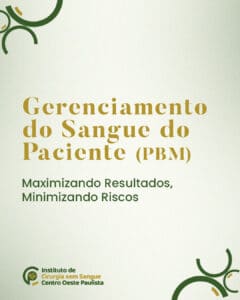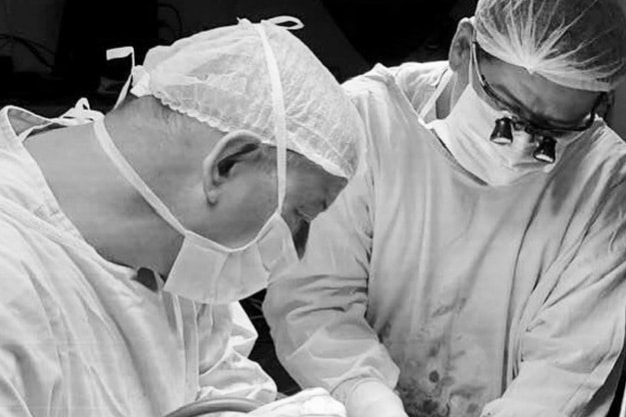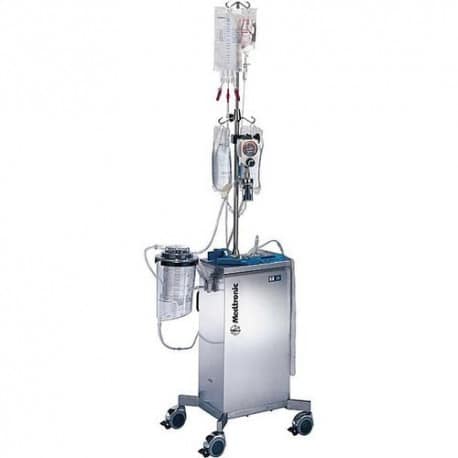
Patient Blood Management (PBM): Maximizing outcomes, minimizing risks
Managing the patient’s blood and hematopoietic system is akin to managing any other organ and organ system during patient care. Specialists oversee the heart, kidneys,
Daniel Molinar, graduated from Faculdade de Medicina USP RP (1985), with medical residency in General Surgery and Urology for 30 years, is a Jehovah’s Witness and has extensive experience in bloodless surgery for general, oncological and urological surgeries.
Juan Carlos Llanos, graduated from Faculdade de Medicina de Botucatu Unesp (1997), with medical residency in general surgery and fellow in Liver and Pancreatic Transplantation at Santa Casa de SP (2003) for almost 20 years, is Professor of Surgery of the digestive system at Unesp, specialist in abdominal oncological surgeries since 2008.



This process consists of recovering the patient’s own blood, which is normally “lost” during major surgeries – it is processed and reinfused after a few minutes, which rules out the possibility of donor blood transfusions. As a result, there is a great reduction in transfusion complications and risks.

Surgeons specializing in bloodless surgery. They are dedicated to performing surgical procedures using only specific equipment for this purpose. The results are impressive: less discomfort for the patient, shorter recovery time and opening up new possibilities for patients who need surgical interventions.

Low risk of complications. A successful procedure ensures patient safety and provides satisfactory results.

Daniel Molinar, an international reference, has vast knowledge and experience. Serving people from different countries and contributing to society through his knowledge and skill.

It is that medicine that uses any and all therapeutic methods, whether pharmacological or surgical, avoiding the use of blood and its components. One of the pillars of bloodless medicine is the management of the patient’s own blood and this is science based on techniques, whether medical or surgical, to conserve the patient’s own blood and minimize or avoid the need for transfusion.
Anyone can undergo surgery without blood, even a child, as long as the care and recommendations of alternative therapies to the use of blood are respected.
There is a program in the USA and Europe called PBM (Patient Blood Management) that is, in free translation, it is the management of the patient’s own blood. This has been a reality for a long time in the US and Europe.
Some procedures are essential, for example, if a patient with anemia and in need of elective surgery must first complete the treatment before having the surgery. In urgent cases, the ideal is to use the blood recovery machine.
There is strong scientific evidence showing that especially patients who avoid transfusion or even a small amount of blood have fewer complications, recovery is much faster and hospitalization time is very short. These benefits of managing the patient’s own blood include a low level of postoperative complications including tachycardia, stroke and infections.
Patients also have a greatly reduced risk of immunological complications, including allergic reactions, they are less exposed to viruses or infections and are not at risk of receiving any different blood types, especially in times of pandemic, such as dengue, chikungunya, zika and covid itself now, has shown itself to be a very safe alternative.
That’s a good question!
We can divide the surgeries into two: one is the elective surgery and the other is the emergency surgery.
In the case of a patient with anemia who requires elective surgery, the condition must first be diagnosed and treated. Is it of fundamental importance to identify whether the cause of this anemia is related to the fact that the marrow is not producing red blood cells, or related to some disease in the intestine, or is it possible that he is having a kidnapping of these red blood cells by a disease in the spleen?
Only after diagnosis and treatment do we perform elective surgery.
In the so-called emergency surgeries, it is evident that we must be careful to use the blood recovery machine because if it is an emergency and the patient already has anemia, it is imperative that we use this recovery machine in the intraoperative period. This is how we must proceed.
Remembering that patients with anemia who undergo elective surgeries have a 48% higher probability of complications than other patients.
Not only can it, but it is the ideal technique to perform surgery to treat cancer without using blood, but using the alternative therapies with which we indicate.
Immunomodulation is one of the possible complications resulting from blood transfusions, in other words, it means that there is a disorganization of the patient’s immune system and thus favors infections and also allows the tumor to advance or even causing new tumors to appear. . In cases where patients undergo surgery or chemotherapy and do not receive blood transfusion, the evolution is usually more effective compared to other patients who undergo transfusion when anemia appears during chemotherapy.
Do you have questions about Bloodless Medicine?
Leave your question in the comments, we’ll be happy to answer.

Managing the patient’s blood and hematopoietic system is akin to managing any other organ and organ system during patient care. Specialists oversee the heart, kidneys,

What is Bloodless Surgery? Bloodless surgery is an innovative method that aims to minimize or completely eliminate the need for blood transfusions during surgical procedures.

In the world of health, there is a constant quest for technological advancements, innovative treatments, and revolutionary medications. However, amidst all this progress, there is
We have a team of professionals ready to serve you.

Medicine without the use of blood is medicine that uses each and every one of the therapeutic methods, whether pharmacological or surgical, avoiding the use of blood and its components. One of the pillars of closed medicine is the management of the patient’s own blood and this is a science based on techniques, whether medical or surgical, to conserve the patient’s own blood and minimize or avoid the need for transfusions.
If you also believe in differentiated medicine and want to keep up with all the news, sign up for our newsletter